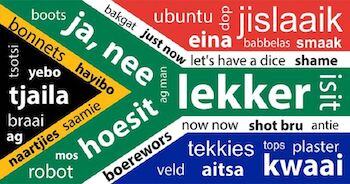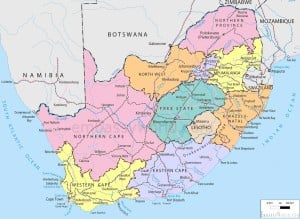
Geographical spread of the Afrikaans language
Afrikaans speakers predominate in two South African provinces where it is the majority language — the Northern Cape and Western Cape provinces. Nevertheless, Afrikaans speakers inhabit all South African provinces. The cities in the country with the largest concentrations of Afrikaans speakers are Pretoria, Bloemfontein, and Cape Town. Pockets of Afrikaans language speakers can be found in neighboring states like Lesotho, Botswana, Malawi, and the Portuguese-speaking country of Mozambique. Many Afrikaans speakers have moved to other countries where some claimed ancestry, like Great Britain or English-speaking countries like Australia or New Zealand. Map of South Africa showing provinces - courtesy of embassyworld.com Afrikaans is not a language restricted to South Africa. The language is spoken in Namibia, as well, where it was an official language until 1990, being replaced by English after independence (it is still a recognized minority language and a lingua franca. There are approximately 200,000 Afrikaans speakers in Namibia, which means 11% of households are concentrated in the capital, Windhoek, and in the southern Namibian regions of Hardap and Karas. Virtually all German Namibians can speak Afrikaans and are familiar with English.
Map of South Africa showing provinces - courtesy of embassyworld.com Afrikaans is not a language restricted to South Africa. The language is spoken in Namibia, as well, where it was an official language until 1990, being replaced by English after independence (it is still a recognized minority language and a lingua franca. There are approximately 200,000 Afrikaans speakers in Namibia, which means 11% of households are concentrated in the capital, Windhoek, and in the southern Namibian regions of Hardap and Karas. Virtually all German Namibians can speak Afrikaans and are familiar with English.
Origins of Afrikaans

In terms of grammatical structure, Afrikaans shares many characteristics with the process of Creole languages developed in European colonies in the Americas. Initially known in derogatory forms like (kitchen language or "wrong Dutch"), local settlers came into contact with other languages and adopted new words to create a "Cape Dutch," which diverged from its original European form. A common misconception is to assume that because of its origins, Afrikaans is mutually intelligible with Dutch. It is not, however. Dutch settlers kept little to no contact with the metropolis, unlike Spanish, French, and English in the Americas. Moreover, standard Dutch had not completely formed at the time of colonization, so the evolution of Afrikaans was separate from that of European Dutch. Nevertheless, speakers of each language can acquire the other with relative ease. At the heart of the evolution of Afrikaans laid the historical significance of non-European languages in developing Afrikaans. These were the languages of slave communities at the Cape: the indigenous Khoi and San languages and Malay. However, Afrikaans can be described as semi-Creole because of the clear predominance of Dutch vocabulary.
Afrikaans grammar
Afrikaans' grammar is far simpler than European Dutch. Vocabulary items are generally truncated in a clearly patterned way (e.g. vogel => voël (bird); regen => reën (rain)). There is also considerable evidence to suggest that Afrikaans developed further through contact with English in South Africa. Likewise, South African English vocabulary and accent bear Afrikaans influence, as evidenced by words such as braai (barbecue), bakkie (pickup truck) and tekkies (trainers). The relative linguistic proximity of both English and Afrikaans is clear in the following sentence, which reads identically (although with very different accents!) in both languages: “ My pen is in my hand”. Click on the link to listen to the quite different accents in Google Translate.History of Afrikaans
As a language, Afrikaans remained a predominantly spoken language until the 20th century. Oddly, for a language of European descent, evidence suggests that Muslim residents first codified Afrikaans in the Cape region (1). The first Afrikaans language movement is nevertheless traced to Die Genootskap van Regte Afrikaners or " the Fraternity of True Afrikaners", which was founded in Paarl in 1875. From this date onwards, the term "Afrikaner" started to narrow in meaning and became associated only with the white population who spoke it. The desire to develop a literary tradition in Afrikaans grew with the establishment of the two Boer Republics in South Africa, the war with the English, after which South Africa was incorporated into the British Empire, mostly to secure a passage to India, and the emergence of Afrikaner nationalism. The Union of South Africa was established in 1910 and enshrined Dutch with official language status and English. However, the Dutch taught in schools was quite different from the spoken Afrikaans language used in South Africa after nearly 250 years apart. Therefore, the movement that advocated for establishing Afrikaans as a language and using its written form grew considerably after 1910. The Afrikaans language finally obtained official recognition in 1925, when it was subsumed under Dutch by an Act of Parliament. The first Bible in Afrikaans was published in 1933. The Afrikaans language developed rapidly as both a literary medium and a medium of science and technology between 1925 and 48, and by then, when the predominantly Afrikaans-speaking National Party took power, there were already four Universities that taught in the Afrikaans language. After 1948, the language became sadly and socially tainted because it was associated with Apartheid. Among other issues, the Soweto uprisings in 1976 made clear the opposition to the Government's plans to impose Afrikaans as a medium of instruction in black schools.
Other African languages we work: Swahili
Status of Afrikaans language
Afrikaans kept their official language status after the democratic elections of 1994, but the official recognition of another 11 indigenous African languages had serious consequences for the public status of Afrikaans. Although the decline of Afrikaans as a public sector language has been noticeable, this has not meant an increase in the use of African languages. English has become South Africa's lingua franca and medium of public discourse, a fact that has produced consternation and a debate within Afrikaans-speaking circles over the future and the development of the Afrikaans language. Despite the evident decline of Afrikaans in the public sector, Afrikaans has experienced a growth in use in the private sector. Compared to the native African languages, the Afrikaans language is a highly developed economic medium, and proof of this is, for instance, the fact that the market for music in the Afrikaans language is larger than the English-language music market. Historically, there has been considerable debate on the linguistic identity of Afrikaans language speakers inside and outside South Africa. Apartheid was associated with white Afrikaner nationalism for the best part of the 20th century, but over 50% of Afrikaans language speakers nowadays are not classed as "white." Most of these are "colored" Afrikaans speakers who live in the Western Cape and Northern Cape provinces. Even though many white Afrikaans speakers call themselves "Afrikaners," the number of people who use either the terms "Afrikaanses" or "Afrikaanssprekendes" (Afrikaans speakers) is increasing.
Need Afrikaans translation? Please contact us for professional translation services
(1) One of the earliest texts written in Afrikaans language was Bayaan-ud-djyn, an Islamic tract written in Arabic Script by Abu Bakr. T.


